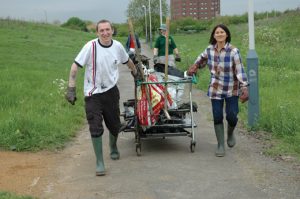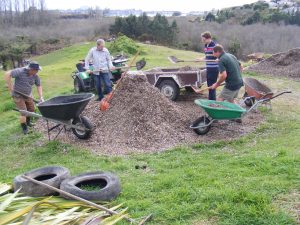ENVIROHUBS: HARNESSING PEOPLE POWER TO PROTECT THE PLANET
SUMMARY
- The early church operated through small groups.
- John Wesley successfully applied this structure to Methodism.
- Cells as an organising principle were rediscovered by the church in the 1980s and 1990s. Many churches adopted a decentralised approach.
- Imagine what could happen if people-power was harnessed through a growing network of neighbourhood creation care groups (Envirohubs).
- Each Envirohub sets its own agenda and has a local focus.
- Take the initiative! NCNZ can assist you in the formation and functioning of your Envirohub.

Small groups
Anyone with a basic knowledge of church history is aware of the significant role of small groups across the centuries in the growth and renewal of the Christian church.
Every time we read from the New Testament we need to remind ourselves that we are being exposed to a small-group movement which multiplied at an astounding pace throughout the Roman world.
For the first 200 years of its existence, the church had no large public buildings available in which to meet.
During that time, neighbourhood small groups were not an extension of the church – they were the church.
When Paul wrote his letters to the church in Corinth, Philippi, Ephesus, or Rome, he was writing to a federation of neighbourhood-based small groups meeting in scattered locations in those cities.
When John Wesley died in 1791, he left behind a church of 10,000 cell groups and 100,000 members.
Cell groups were so important to the Methodist Church that a person could not enter the celebration service unless he or she showed a ticket that proved he or she was in a cell group during the week.
God transformed people through Wesley’s structure of cell and celebration.
Many believe that God used Wesley and the Methodist movement to save England from spiritual, moral, and even physical destruction.
After hundreds of years of centralisation, the Christian church rediscovered the benefits of decentralisation through the home cell-group movement of the 1980s and 1990s.
Cells
Cells are the basic building blocks of all life forms, and this fundamental insight was once again applied to the body of Christ around the world.
The word spread that Paul Cho’s church and several other huge churches in Seoul reached their massive size through home cell groups and that the technique would work anywhere.
Many communities of faith shifted from a centralised approach in achieving their objectives to a decentralised approach.
It was realised by many that if you want your church to have a bigger impact and experience more dramatic growth, it might be time to think smaller.
When it comes to building a healthy and invigorated community that attracts visitors, small groups were seen as the key.
The small group once again became the basic building block of the life of the local congregation and the most powerful and versatile structure for change.
A quiet revolution took place, as cells became the organisational basis of many churches, particularly in South America, Asia and Africa.
A pattern of rapid of cell multiplication became the common thread that linked all of the rapidly growing worldwide churches.
A key feature of such churches was also that everyone participates.
The need to care for our planet, which is our common home, is one that now resonates with a wide range of people, whether they are followers of Jesus or not.
Imagine the potential if the neighbourhood small-group principle could be translated into a vibrant, ever-expanding framework for creation care.
What if one household invited others who live nearby to join them in pursuing a specifically-local creation care project?
An initial gathering might agree on the parameters of involvement, and because the focus would be on a local project the whole neighbourhood would potentially benefit, quite apart from contributing in microcosm to the overall health of the environment globally.
Envirohubs
Imagine a multiplicity of creation-care cells (“Envirohubs”), a vast network, one in every neighbourhood, each playing its own unique part in caring for the planet.
Imagine people of faith rubbing shoulders with those who aren’t yet, getting to know them, pitching in with them, and expressing the life of Christ as they do so.
Envirohubs are a context in which relationships can blossom and in which others may gradually be influenced towards knowing Jesus.
Most importantly, they are a way of harnessing the energy and skill of many more people in addressing the ecological challenges which we now face.
Each Envirohub is uniquely linked to its own immediate context.
I live in Welcome Bay, Tauranga. Just across the road is Waipuna Park, and adjacent to it is the Johnson Reserve. The formation of an Envirohub to protect and preserve these two areas would be easy.
On the other hand, the members of the Envirohub may decide to do something completely different, such as lobbying their local councillors or MPs.
Each Envirohub sets its own agenda, but whatever activity the members determine, each is an opportunity to bring together neighbours who have never spoken to each other, develop community spirit and involve all ages in a common cause.
Envirohubs are a concept, and enterprise developed by New Creation New Zealand.
NCNZ wants to promote and facilitate the Envirohub movement throughout our country.
Their vision is that hundreds of Envirohubs come into existence–a mass movement which is community-based, inclusive, and empowering, as well as rapidly and radically transformative for the natural world.
Establish an Envirohub in your neighbourhood! NCNZ can provide guidelines, advice, liaison, networking and resources. Get in touch with them if you feel they can assist you. They would love to help you on your journey.
